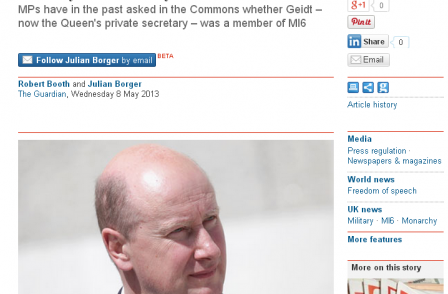
The Guardian has been censured by the Press Complaints Commission over “serious overstatements” and inaccuracies in three articles about the Queen's Private Secretary and his role in signing off the Royal Charter on press regulation.
The PCC said it was a "particularly concerning case" because the innaccuracies were central to The Guardian's reporting and directly contributed to the paper's criticism of Sir Christopher Geidt, who complained about three articles published on 8 May 2013.
Geidt said that his role was to act as a channel of communication between the Government and the Queen and the following assertions made by The Guardian were all wrong. The Guardian claimed that Geidt was:
-
"tasked with handling the creation" of the Royal Charter
-
"jointly responsible" for setting it up
-
"the man who is now charged with establishing" the Royal Charter
-
And "one of the final arbiters of press regulation".
Geidt said the newspaper’s criticisms of the Royal Charter process in its leader column, which focused primarily on his role, were unfounded.
He said the Guardian had “wilfully ignored accurate information it had received about his role before publication”.
And he also said that it had repeated allegations that had been withdrawn following his libel action against John Pilger and Central Television.
He asked for public and private apologies, along with the removal of the coverage from the newspaper's website and an assurance by the Guardian that it would not publish anything "colourably similar" in future.
The Guardian told the PCC that there was a public interest in its investigation of Geidt’s role and that it was entitled to “take a sceptical view of processes that many regarded as opaque”. It admitted that its coverage contained inaccuracies, but said that these were not deliberate and that it had offered a correction at a very early stage.
The Guardian said that it had understood from its sources that Geidt's role was not merely ceremonial and that it was difficult to be "definitive". It also pointed out that it had published a 575-word response by a friend of Geidt condemning the paper’s "smearing attack".
The Guardian offered to publish a lengthy apology in its corrections column accepting that it had "overstated and misrepresented" Geidt's role, apologising for "serious errors" and for "any damage to his reputation”. It has also amended the articles online, but it has refused a request to remove them altogether and said it could not promise not to publish anything “colourably similar" in future.
It said that these requests suggested an attempt to "quash" discussion of legitimate issues and warned that for the PCC to agree to them would pose “a serious threat to freedom of expression”.
The Guardian declined to apologise privately to Geidt and refused his request that the apology appear on page five of the paper. Today's PCC adjudication was published on page 10.
The PCC said that the Guardian had published three items – a news report, a profile, and an editorial – “which had contained serious overstatements, presented as fact, on this issue”.
It said that this was “a particularly concerning case” because “the inaccuracies were central to the reporting, they appeared across all three items and they directly contributed to the newspaper's criticisms of the nature of the complainant's role and his personal suitability to fill it”.
The PCC said it would not be appropriate for it to require assurances from publishers about what they report on or for it require them to express private regret.
A Guardian News and Media spokesperson said: "As acknowledged by the PCC, the Guardian is entitled to investigate matters that we consider to be in the public interest. However, we are surprised that this complaint has been upheld since we recognised at an early stage that the articles in question had contained inaccuracies that were not deliberate, we took fast remedial action to correct and acknowledge the errors, and the PCC itself admits that we also made an offer of an appropriate apology. We are happy to publish the PCC adjudication in order to resolve this matter."
Email pged@pressgazette.co.uk to point out mistakes, provide story tips or send in a letter for publication on our "Letters Page" blog
